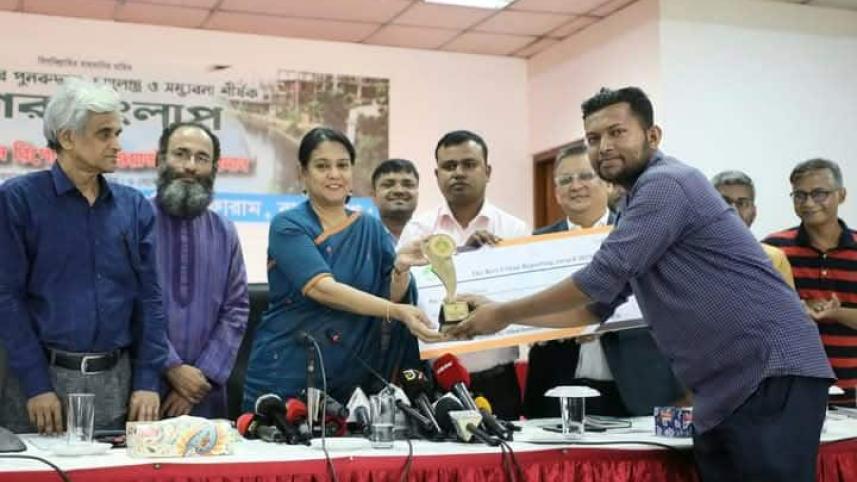Saving Dhaka’s wetlands essential for saving the city: Adviser Rizwana

Saving Dhaka's wetlands is essential for saving the city, and there is no alternative to restoring water bodies, said Syeda Rizwana Hasan, adviser to the Ministry of Environment, Forest and Climate Change, and the Ministry of Water Resources.
"The ongoing work to recover Dhaka's canals has already benefited residents. This year, even during peak monsoon, waterlogging in the city was less than in previous years. We have also allocated funds from the Climate Trust Fund to the Dhaka district commissioner for restoring 40 ponds," she said.
Rizwana Hasan made these remarks at a dialogue, titled "Restoration of Dhaka's Water Bodies: Challenges and Possibilities" and during the Best Urban Reporting Award 2025 ceremony, organised by the Urban Development Journalists' Forum-Bangladesh (UDJFB).
The event was presided over by UDJFB president Motin Abdullah and moderated by general secretary Faisal Khan. Among others, former National Press Club president and editor of Desh Rupantor Kamal Uddin Sabuj, UNDP Bangladesh project manager Yugesh Pradhanang, former chief engineer of Dhaka South City Corporation Md Nurullah and former UDJFB president Amitosh Pal also spoke at the programme.
This year, six journalists received awards in five categories of the Best Urban Reporting Award. In the print and online categories, on urban planning, Md Jahidul Islam (staff correspondent at The Business Standard), on public service and sufferings, Rahat Hossain (Protidiner Bangladesh), on irregularities and corruption in service agencies, Rashidul Hasan (Daily Sun) received awards.
In the television category, Kafayet Ullah Chowdhury (senior reporter, Banglavision) and Delowar Hossain Dolon (staff reporter, Ekhon TV) received the awards. In the investigative category, the award went to Nazmul Sayed (Independent Television).
"When people are aware and united, protecting water bodies is not difficult. We saw this in Bholaganj, where unity stopped illegal stone theft. We are working with values, but in terms of legacy, we are still lagging," Rizwana said.
She added that during her tenure, she has not approved any deforestation, though many permits were granted under previous governments.
On Dhaka's Detailed Area Plan (DAP), she emphasised: "In the DAP, there will be no such thing as 'general wetlands.' Wetland means wetland. We have revised the plan to remove all categories, ensuring no wetland can be filled under any circumstance. We have also finalised the Haor Protection Order, which provides guidelines on houseboat operations and agricultural activities in haor areas."
Presenting the keynote paper, Md Musleh Uddin Hasan, professor of urban and regional planning at Buet, said Rajuk and city corporations have launched eviction drives to free canals and rivers from encroachment. "Illegal structures have already been demolished and land reclaimed in several areas. But land-grabbing by influentials and politicians, planning gaps, and lack of institutional coordination remain major challenges," he noted.
"To safeguard wetlands, government commitment, political will, and international assistance are crucial. Otherwise, Dhaka's environment and urban life will worsen," he said.
Architect Sujaul Islam Khan added, "Through the DAP, plans are underway to develop about 800 square kilometers of Dhaka and its surroundings, largely to benefit housing companies. This is encouraging unplanned urbanisation."
Emphasising the need for government agencies to act responsibly, Best Urban Reporting Award jury member Mohammad Helemul Alam said that protecting Dhaka's waterbodies, playgrounds, parks, and open spaces depends on these agencies fulfilling their duties. Yet, in the name of development, they often destroy what they are meant to safeguard.



 For all latest news, follow The Daily Star's Google News channel.
For all latest news, follow The Daily Star's Google News channel.
Comments